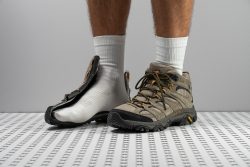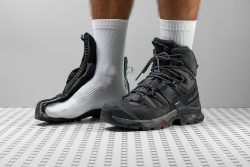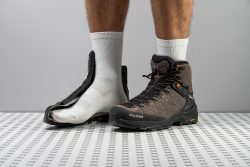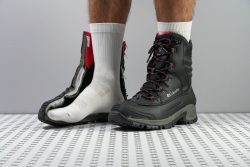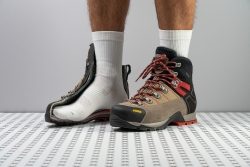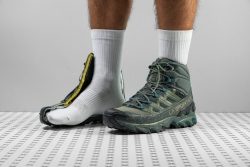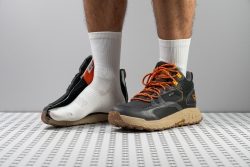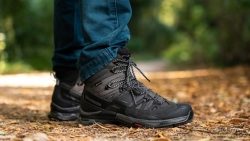7 Best Snow Hiking Boots in 2025
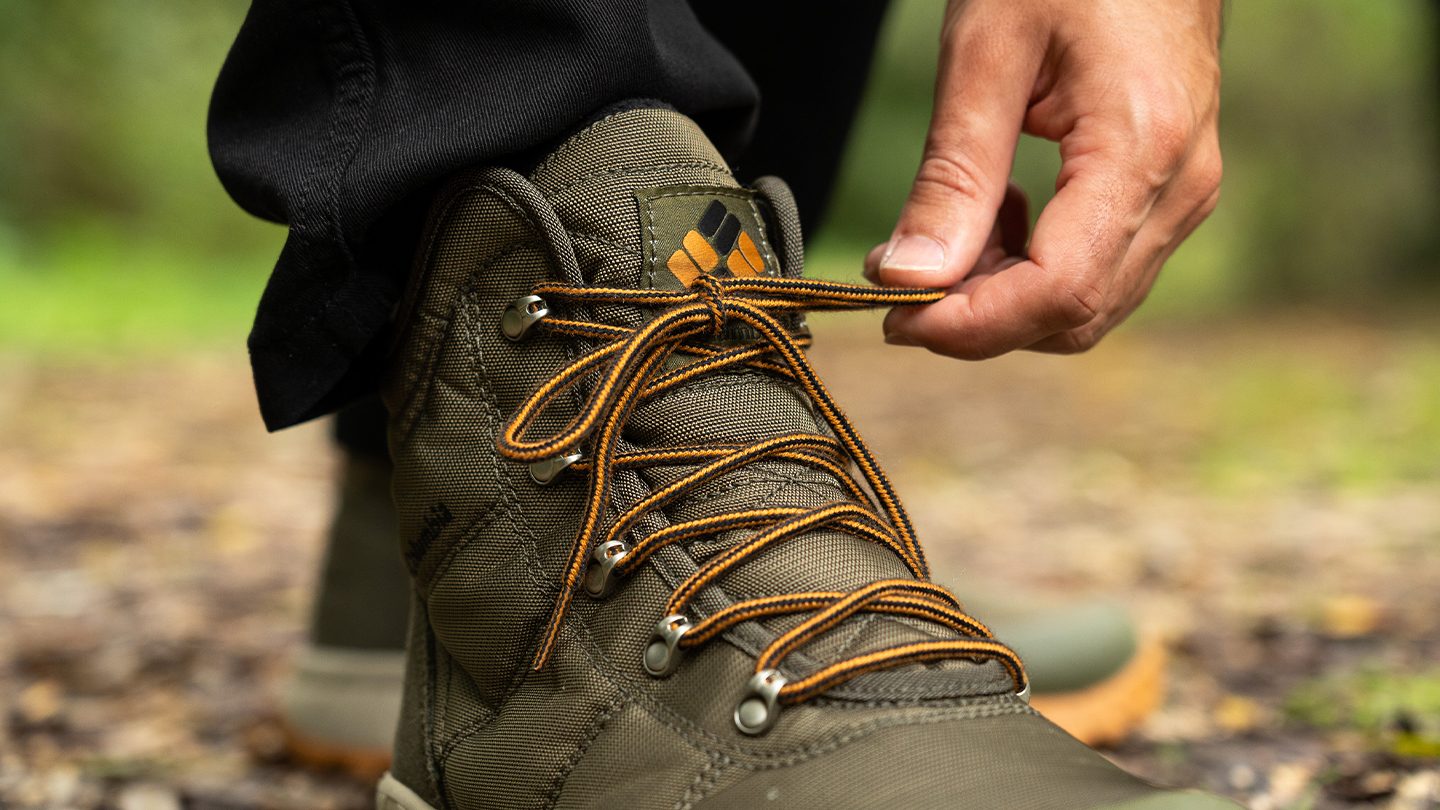
We buy shoes ourselves. We earn commissions when you buy through us, at no extra cost. Why trust us
Hiking in the snow is a quite beautiful, calming experience. But as the landscape transformes into a cold and slippery yet still magical wonderland, you need to protect your feet with comfortable footwear with reliable traction and insulation.
After sliding, slipping, and trudging through snowy roads and icy trails, we, a team of wear testers, chose our best picks. We stand by our choices, as these boots have kept our feet dry, comfortable, and upright throughout the entire journey.
We’ve done the legwork and the lab tests and reviewed all the boots very carefully. Check out our top highlights in various categories depending on your style and preferences.
How we test snow hiking boots
Here are exactly the things we do to deliver objective reviews and top picks in different categories:
- We use our own money to buy snow hiking boots from various brands. This keeps our reviews 100% independent.
- After beating up each pair, we evaluate its fit, protective features, shock absorption, stability, durability, insulation, traction, and overall performance across all kinds of surfaces. We also check all parameters of the boots, particularly their reliability and comfort level during the most challenging part of the outdoor adventure.
- We get the lab data. We cut the boots in half and use various tools (like durometers, tire tread gauges, calipers, smoke machines) to measure all the important features of hiking boots.
One of the things we investigate that is especially important for snow hiking is how a shoe reacts to cold weather. We measure the softness of the midsole and the flexibility of the boot at room temperature. Then we freeze the boot and repeat the tests. Looking at the change in softness and stiffness, we're able to anticipate how the boot will feel in very cold weather.
Best snow hiking boots overall
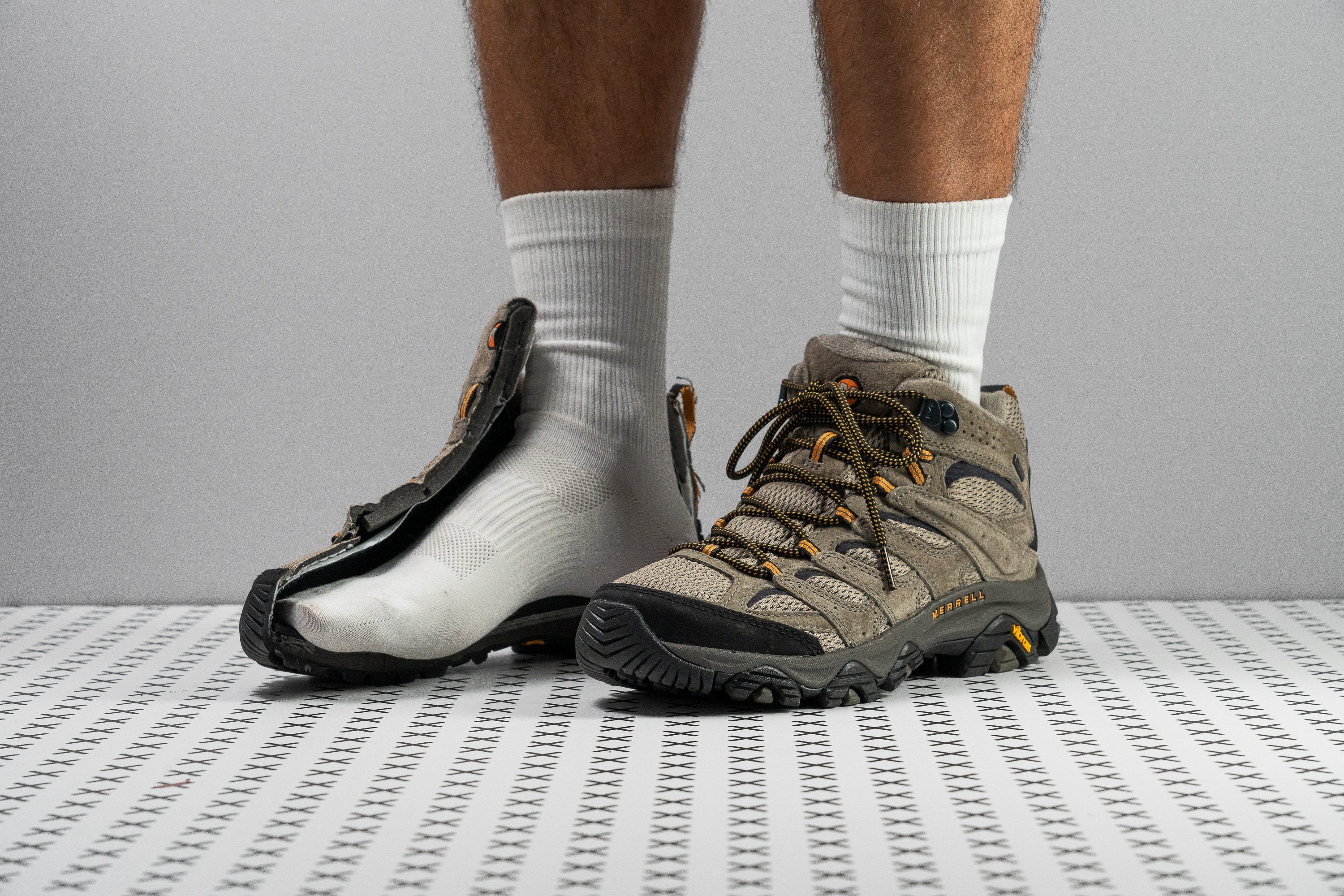




















































What makes it the best?
The Merrell Moab 3 Mid GTX delivers cushioned protection and unwavering support. This boot makes each step pleasurable through its light and loose build, allowing us to fully enjoy our treks without counting the miles. Therefore, it’s our top snow hiking pick among the boots we tested on foot and in the lab.
With our caliper, we found the heel to be 36.1 mm thick, providing enough impact dampening and underfoot protection. Our shock absorption test reveals a moderate score of 88 SA, meaning it also offers much-needed surface sensitivity. Paired with a modest forefoot, the result is a steep 13.5 mm offset that relieves lower leg pressure.
Even as we carry loaded backpacks, the cushion won’t bottom out. On top of this, a nylon shank is placed right under our arches for added support, especially during long-haul hikes. Because of its clever placement, this boot remains maneuverable, emerging as flexible as the average (31.8N).
Even with all the cushion and support, this boot remains light at 17.5 oz (495g). Being 6.8% below average, we found it comfortable for extended treks.
While this boot features deep lugs, they are not toothy enough to handle soft terrain like mud. Those who need more aggressive traction should go for other options.
Pros
- Best-in-class waterproofing
- Great stability for moderate hikes
- Supportive for all-day wear
- Comfortable step-in feel
- Excellent grip on hard terrain
- Secure lockdown
- Sturdy construction
Cons
- Moderate impact protection
- Mesh panels are easy to tear
- Not for mud or soft terrain
- Moderate impact protection
Best snow hiking boots for backpacking
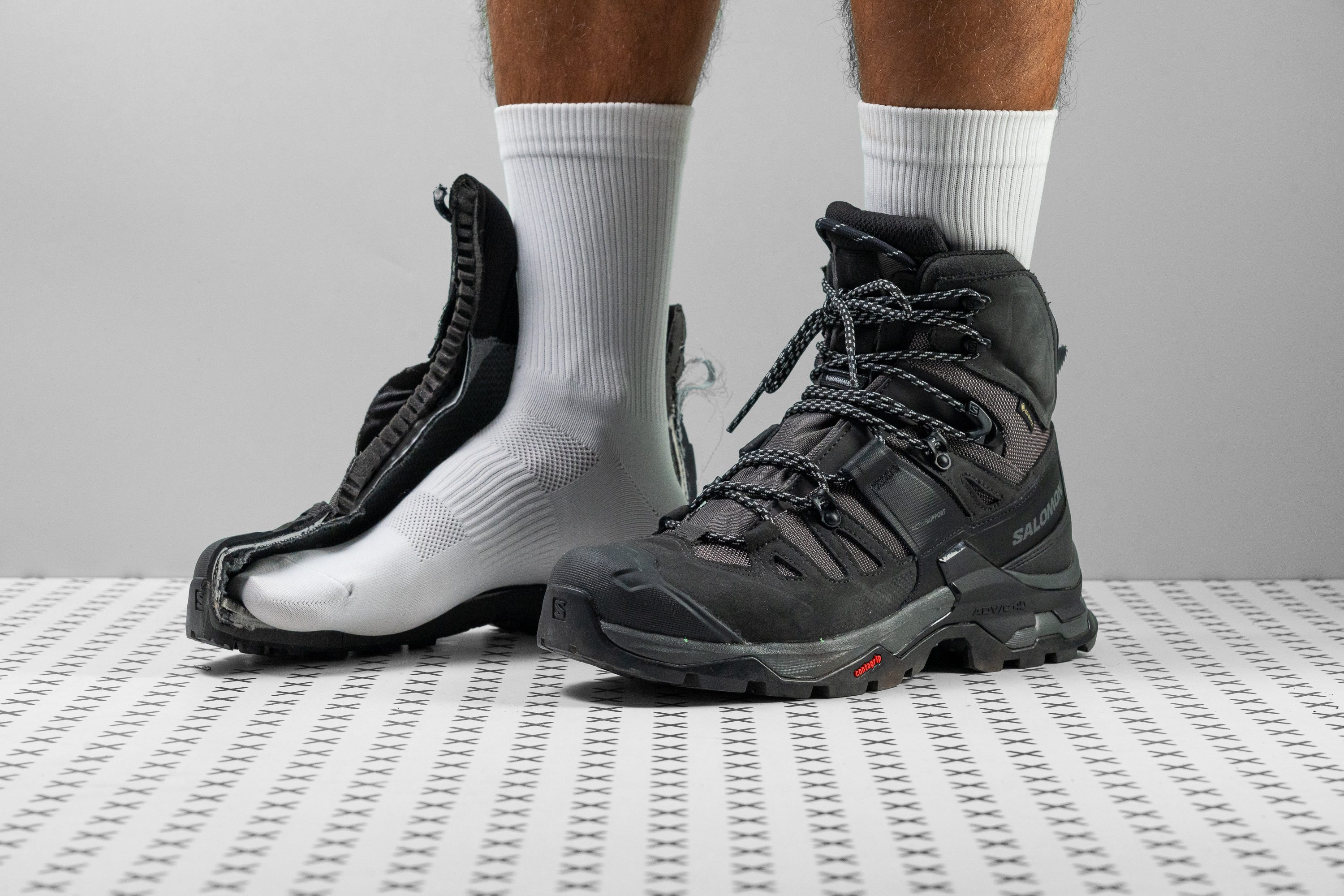















































What makes it the best?
As adventurers who love winter backpacking, we can’t say no to the Salomon Quest 4 GTX. This waterproof boot has integrated stability features of epic proportions, it’s superbly comfortable, even in cold conditions, and defied our Dremel in our durability tests. All this and more is why we had to choose the Salomon Quest 4 GTX as the best snow hiking boot for backpacking.
Like many Salomon options, the Quest 4 GTX comes with the unbeatable ADV-C 4D Chassis stabilizer. Connecting the laces to a shank in the midsole, it provides us flawless support and stability, especially when we are carrying heavy packs. We put it to the test in the lab by twisting the boot torsionally. It’s an incredibly rigid boot, so we rated it 5/5 for torsional flexibility. On the trail, we feel surefooted and safe from painful twists.
Sporting a mighty stack height of 38 mm, there is a ton of cushioning below the heel. We found it especially welcome while hiking with heavy loads. At room temperature our durometer declares the midsole to have an almost average softness of 27 HA, blending support with comfort. What really blew us away was the way the midsole performed in the cold. After 20 minutes in the freezer, we tested the midsole with the durometer again. It had only stiffened to 32.9 HA. It feels and performs almost the same in cold weather as on warmer days, so we didn’t have to adapt ourselves to the change.
This impeccably waterproof and ultra-durable boot keeps us protected from whatever the outside world can throw at us. The Gore-Tex membrane and fully gusseted tongue stopped snow, rain and stream water from getting in, keeping our feet warm and dry all day. Rocks are no match for the sturdy multi-layered upper, which came away from a 12-second duel with our Dremel practically unscathed. If it were allowed, we’d award it 10/5 for durability!
A boot that packs in so much can be expected to weigh over the odds. The Salomon Quest 4 GTX weighed a hefty 23.4 oz (663g) on our scales, 24% heavier than our other waterproof hiking boots. Hikers looking for a lighter boot for more moderate hikes can look into the Salomon X Ultra 4 Mid GTX instead.
Pros
- Exceptional durability
- Top-notch waterproofing
- Excellent underfoot protection
- Highly secure ankle support
- Fantastic stability
- Comfortable in-boot feel
- Effective grip on various terrain
- Fits as expected
Cons
- A bit heavy
- Gets very stiff in cold
Best snow hiking boots for technical terrain
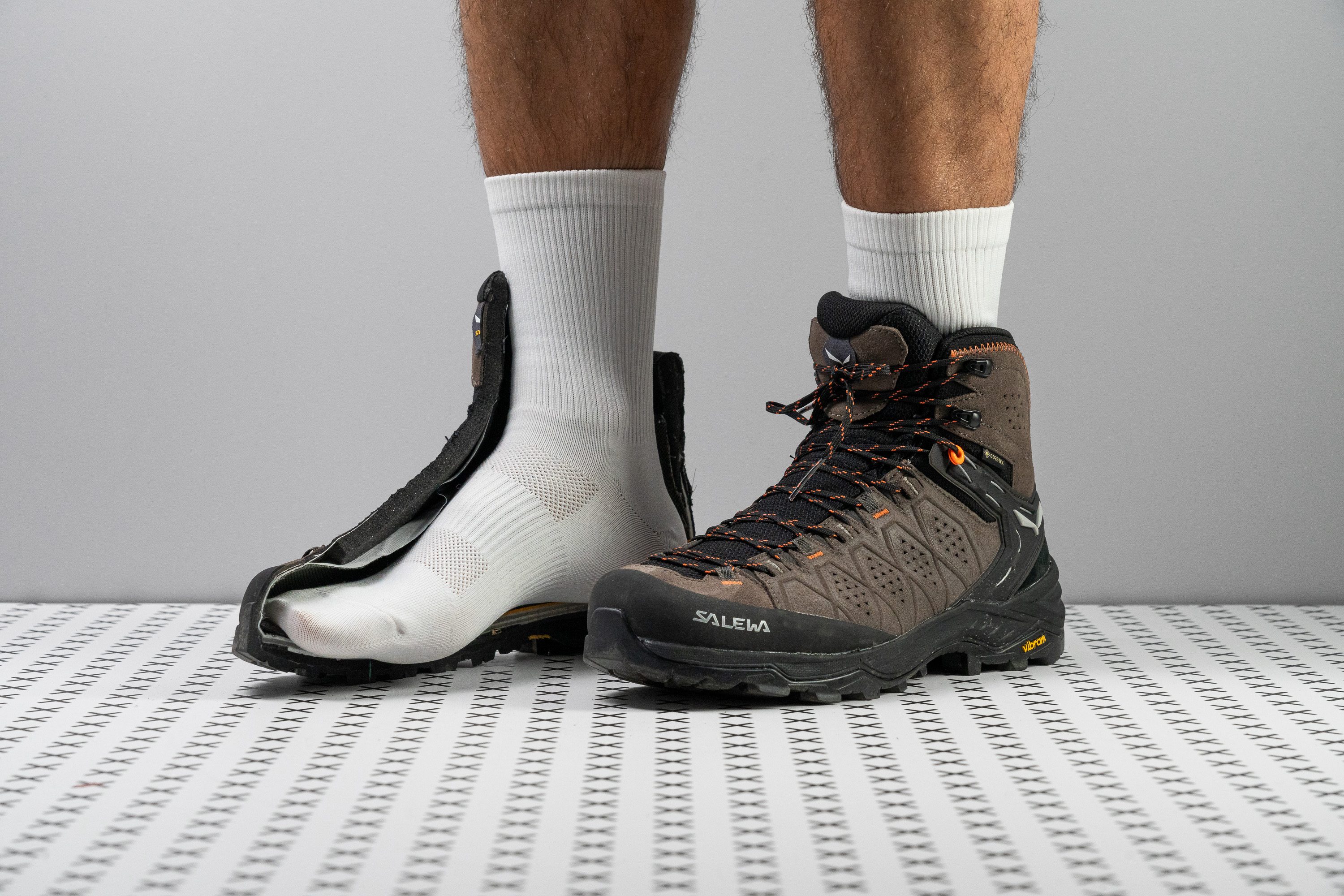













































What makes it the best?
We felt fearless in the mountains, armored with the best snow hiking boot for technical terrain: the Salewa Alp Trainer 2 Mid GTX. Our lab tests confirmed its rock-solid build, highlighted by toothy lugs that bite into the ground, a winterproof upper, and a platform that stays stable on any surface.
We turned the boot upside down and measured deep 5.2 mm lugs, arranged in an aggressive tread pattern that latches onto harsh surfaces in full force. When tackling inclined segments, our footing felt steady with its impressive braking power. The rubber also shielded us from sharp rocks or roots underfoot, proven by its wear resistance in the lab. Our Dremel managed to create only a small 0.6 mm dent.
In a sudden downpour or when the temperature drops, our feet remain cozy and warm. The upper features the Gore-Tex Extended Comfort membrane, which effectively inhibits airflow. In our smoke test, nothing could escape, so we gave it the minimum 1/5 breathability rating.
We can tackle high-mileage hikes on challenging surfaces because the boot’s exceptional support prevents our muscles from overworking to stay stable. It includes a stiff internal shank that makes the boot twist-proof, verified with its 5/5 torsional rigidity score. With such strong ankle support on the foot, it’s hard to lose our balance.
Unfortunately, it’s quite a burden to bring around at 19.2 oz (542g). Hikers who prefer maneuverability should go for a light and agile boot.
Pros
- Fantastic stability on challenging trails
- Extra strong grip on technical terrain
- Secure lockdown and ankle support
- Exceptional durability
- Excellent waterproofing
- Great underfoot protection
- Flexible collar is handy on descents
- Fit can be regulated with an insole
Cons
- Drop is twice as high as stated
- Collar lining lacks durability
Best insulated snow hiking boots
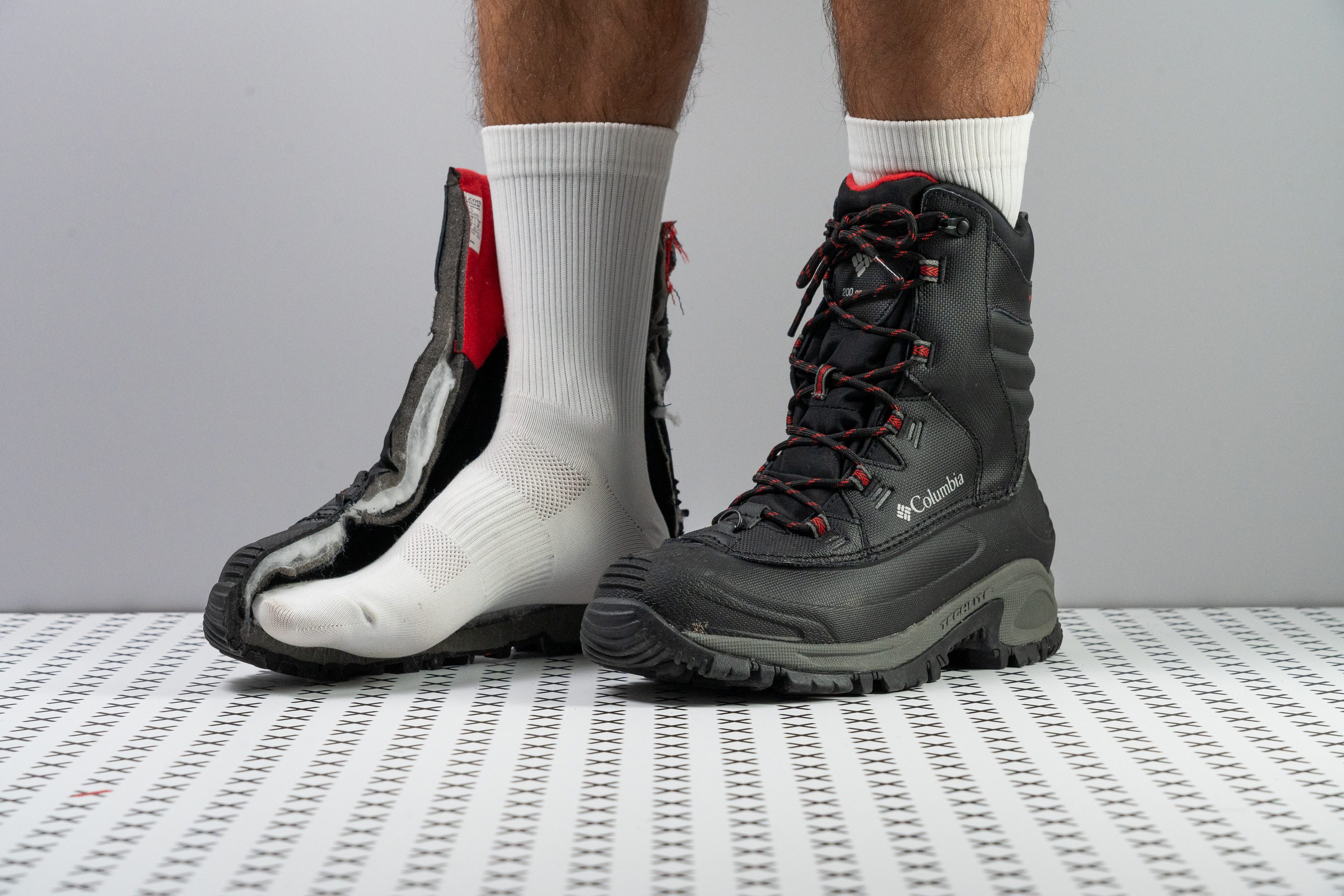































What makes it the best?
There is no need to set aside our hiking boots to wait out the cold winter months when we have the Columbia Bugaboot III to hand. With a cozy 200g insulation, this boot keeps our feet toasty in sub-zero temperatures. It is superbly supportive and grippy in icy conditions, not to mention boasting a high-performing midsole that works as it should in the cold. It’s no wonder, then, that we chose the Columbia Bugaboot III as our best insulated snow hiking boot!
Well-packed with 200g of insulation both around and below our foot, the Bugaboot III remains cozy in temperatures down to 30°F (-1°C). The 7 inch (17.8 cm) collar stops snow and cold air from getting in, as well as the warmth from our feet out. We pumped smoke into the boot to test for breathability, and not surprisingly it scored the least breathable rating of 1/5. This is definitely a snug winter boot!
The high collar not only keeps deep powder snow out of the boot, but also supports our ankles. The fully gusseted tongue provides a comfy cushion against the laces, and the heel counter is rigid enough to keep our heels snugly in the boot. In our manual tests, the heel counter scored 4/5, where 5 is the stiffest. Altogether, it’s almost impossible to injure ourselves by rolling an ankle in these boots.
The traction didn’t let us down in slushy, snowy conditions. We measured the lugs to be 5.7 mm, 1.2 mm deeper than average. In addition, our durometer tests of the outsole showed 85.5 HC, slightly softer than the average 87.5 HC. It gives us an advantage in cold weather, as the softer outsole grips better to slippery surfaces. Altogether, we felt confident striding out in the snow.
The Bugaboot III has midsole material in bucketloads! Its impressive heel stack height of 46.9 mm offers an extra centimeter of insulation from the frozen ground compared to the average hiking boot. But what we love most about the midsole is how it performed in our winter durometer tests. After 20 minutes in the freezer, the midsole was only 21.5% firmer than at room temperature, meaning this boot’s cushy and supportive characteristics remain intact, even on the coldest day.
The Columbia Bugaboot III looks hefty, and our lab scales confirmed our suspicions. At 26 oz (737g), it is 34% heavier than the average for winter hiking boots. As such, we don’t recommend it to hikers looking for a lightweight winter option.
Pros
- Jaw-dropping comfort
- Remarkable insulation
- Watertight upper
- Excellent durability
- Plenty of cushioning
- High level of support
- Reliable grip
- Affordable for its kind
Cons
- Restrictive toebox
- Heavier than average
Snow hiking boots with the best support
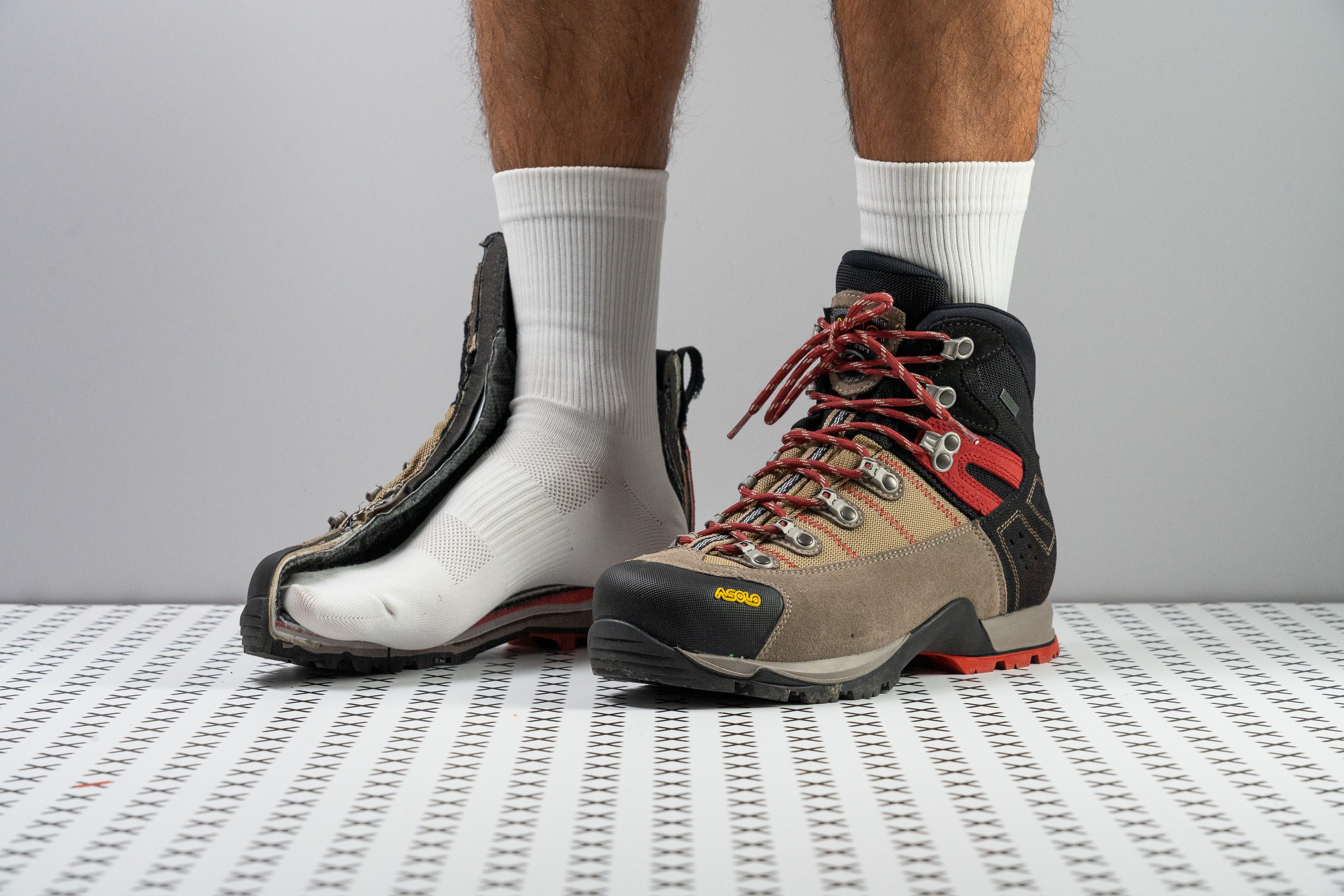


















































What makes it the best?
Our wilderness explorations are guaranteed safe thanks to the Asolo Fugitive GTX. Its protective nature and rigid build shelter us from all unwanted elements on multi-terrain hikes — water, wind, sharp debris, slips, and awkward trips. Crowning Fugitive GTX as our most supportive snow hiking boot is a no-brainer.
The Gore-Tex membrane’s defense against water and snow is unquestionable. We crossed river streams and slush with dry and toasty feet. It has a fully gusseted tongue and a high collar to ensure debris stays out and heat stays in. The boot even includes a toe bumper and suede layers for extra protection.
The midsole highlights support by putting together a firm cushion and a rigid platform. Our durometer confirms the foam is 34.0% harder than average, while the boot bends to a force 97.2% greater than average. Both elements enhance surefooted strides on uneven ground.
This boot takes traction seriously, and the patterned outsole works its magic on all types of terrain. Whether on frozen paths, loose ground, or rocky terrains, we're blown away by its grippy bite.
Outsole durability is a let-down as it started peeling away only after a few test hikes. Though the boot is designed to be resoled when needed, it should still last several months.
Pros
- Great grip on mixed terrain
- Fantastic underfoot protection
- Worth the price
- Waterproof
- Reliably supportive
- Feels light on the foot
- Zero break-in
- Balance preserver
Cons
- Outsole started peeling off
- Not-so-cushy footbed
Best lightweight snow hiking boots
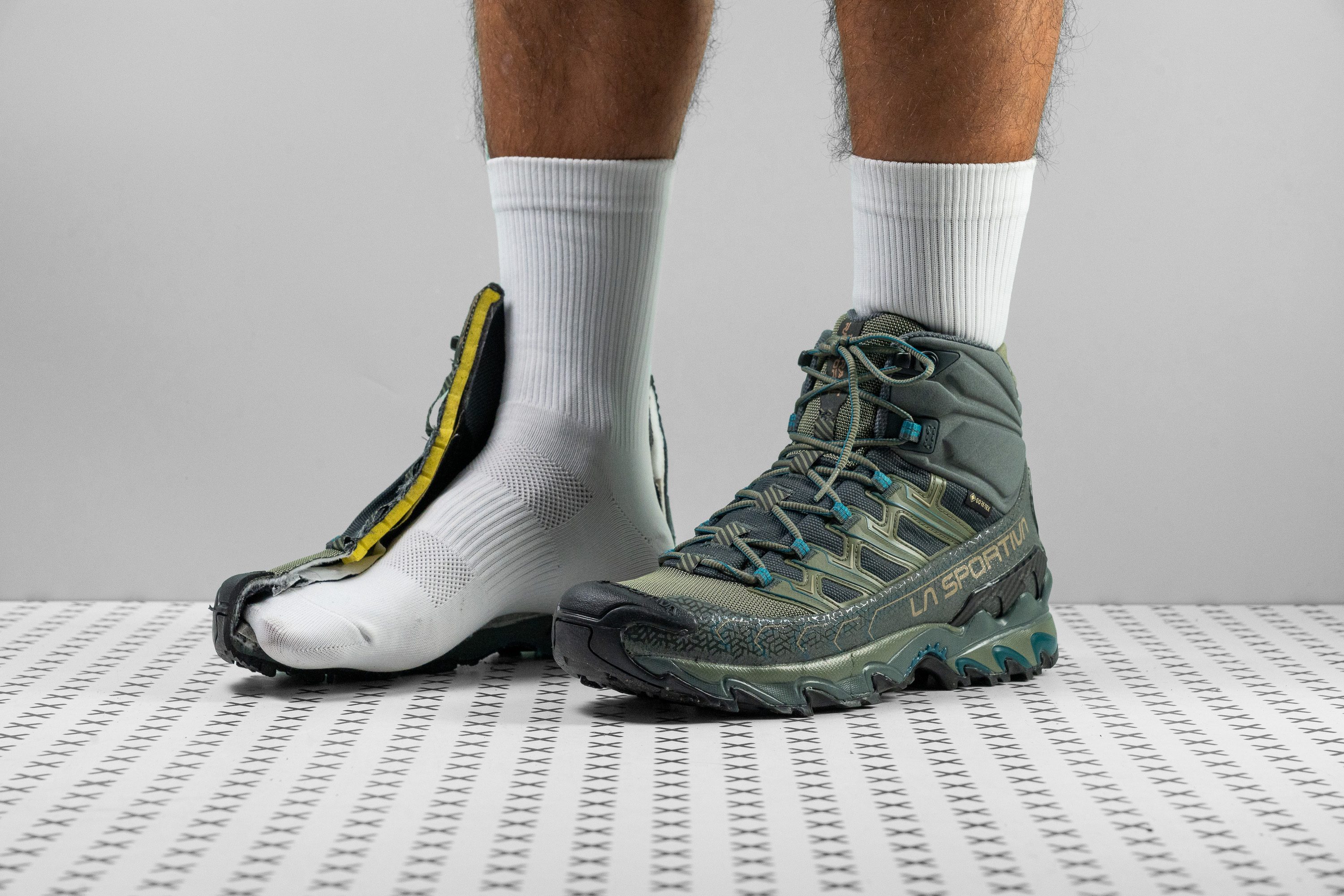















































What makes it the best?
After testing in the lab and out on hikes, The La Sportiva Ultra Raptor II Mid GTX had us in raptures! An incredibly lightweight boot, it retains its flexibility in the cold, and is spectacularly waterproof - it even has an extra trick up its sleeve regarding the latter. All this led us to believe without a doubt that the La Sportiva Ultra Raptor II Mid GTX is the best lightweight snow hiking boot.
Despite all appearances to the contrary, there is nothing clunky or heavy about the Ultra Raptor II! It feels light and agile on our feet, and the scales confirmed our suspicions! This boot weighs 14.6 oz (415g), which is 19% less than average! We walked further and faster on our hikes, and still had energy to burn at the end of it!
Both at room temperature and on our chilly hikes, this is a flexible boot when compared to the average. We bent it to 30°, which registered 26.9N at room temperature, 15.4% more flexible than average. But we also wanted to know how it performs in winter conditions, so we left it in the freezer for 20 minutes before testing it again. Of course, it stiffened up, but still manages to be 25.7% more flexible than the average boot. The Ultra Raptor II clearly crushes the competition in cold conditions!
We tested the waterproofing of these boots by standing in 5-inch puddles, and they didn’t let a drop of water in. The Gore-Tex membrane and gusseted tongue work together to keep the water out (and heat in on cold days!). An elastic gaiter-like tongue around the collar adds to the appeal, helping to keep snow, water and debris out of the boot. This little gem should be a given on all waterproof hiking boots, as far as we are concerned!
This is not a boot for hikers with wide feet. Our average-width feet were already bordering on pinched. When we checked in the lab, we found the forefoot to be 106 mm, 6.9 mm narrower than average, and the heel an even more surprising 8.3 mm narrower than average. We advise wide-footed hikers to look into other options.
Pros
- Unbelievably lightweight
- Excellent waterproofing
- Doesn't let debris and falling rain/snow inside
- Exceptionally robust and durable
- Phenomenal grip on technical terrain
- Not so stiff and firm in low temperature
- Sufficient impact protection
- Highly supportive collar
- Ample flexibility
Cons
- Narrow platform
- Not for wide feet
Best city-to-trail snow boots
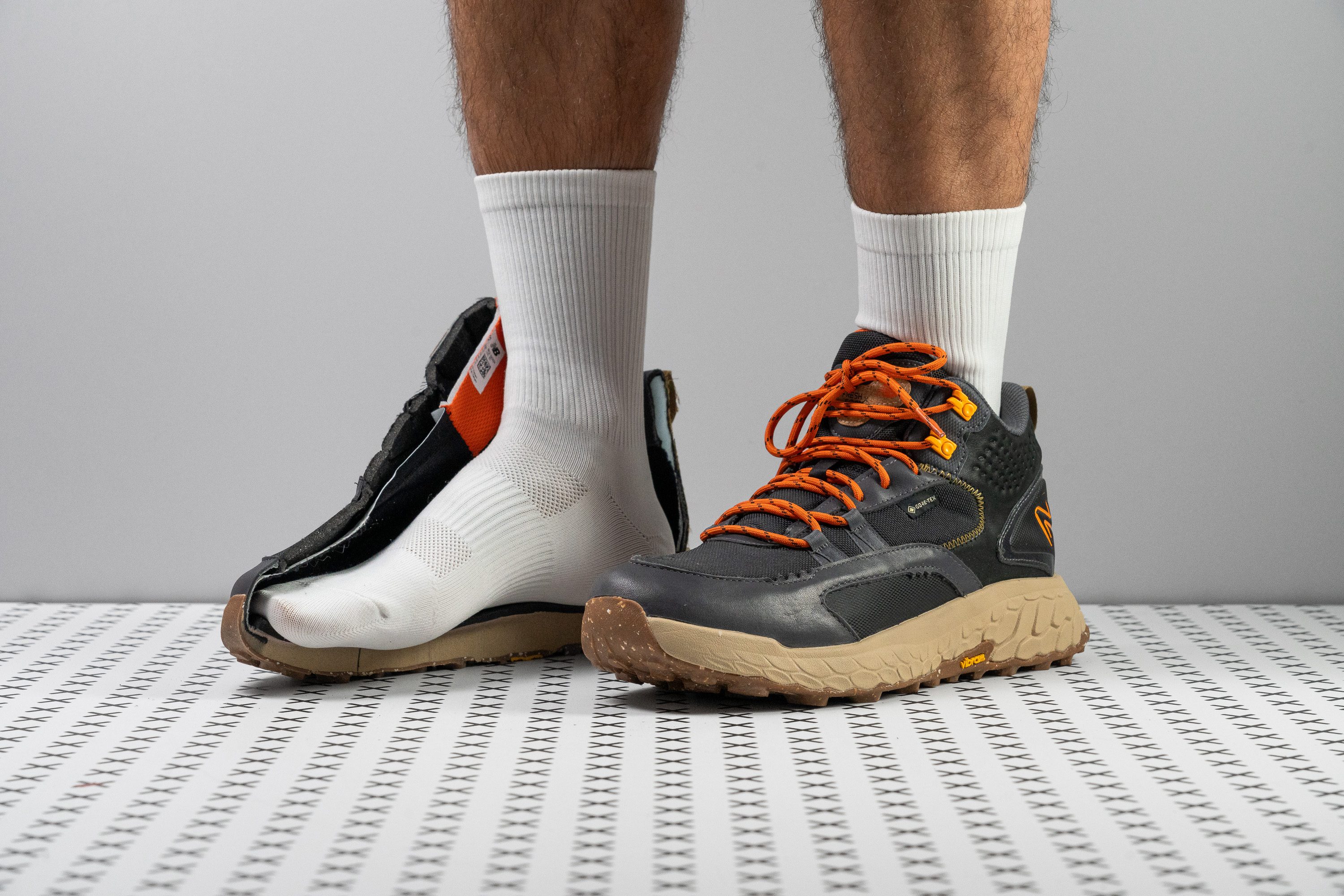










































What makes it the best?
The New Balance Fresh Foam X Hierro Mid GTX served as our defense against harsh winter winds and slippery, icy streets, making it our best city-to-trail snow hiking boot. Lab assessments reveal that it features the highly grippy Vibram rubber underfoot for steady footing, and the reliable Gore-Tex membrane in the upper for its warm embrace. Because of its light and maneuverable build, we found it easy to move seamlessly through various terrains.
Hierro Mid GTX never burdened us, riding more like a trail shoe with its minimal 13.7 oz (388g) build. At this weight, it’s 26.9% lighter than the average boot! Its pliable forefoot adds to its effortless sensation, keeping a natural feel as it emerges 29.8% more flexible than the average boot. These elements allow us to be in control of our footwork as we navigate through uneven terrain.
The boot made us feel at home even as the temperatures dropped. It effectively contained our body heat and kept our feet dry as we passed through piles of snow. In our smoke test, the Gore-Tex membrane didn’t let any vapor escape, confirming its airtight nature with the lowest 1/5 breathability score.
We maintained confident footing on snow-covered streets with the Vibram Megagrip’s dominant grip. It features deep 4.1 mm lugs, which are studded with micro dots, enhancing its bite on soft ground like fresh snow.
We find this boot to be more of a day hiking shoe. For more challenging hikes, we recommend finding a more technical option for added support.
Pros
- One of the softest hiking boots
- Generous cushioning for long miles
- Much lighter than average boot
- Lively and bouncy ride
- Excellent stability and lockdown
- Flexible forefoot
- Effective waterproofing
- Durable upper and outsole
- Grippy on varied terrain
Cons
- Gets notably firmer in low temps
- Low flood level
- Not for technical terrain
4 features to look for in snow hiking boots
Before heading out on that snowy hike, it’s important to know what type of the terrain you’ll cover and the temperatures that are expected.
We will break it all down by the features needed in snow hiking boots:
- Waterproofness: waterproof upper stops the snow/water from getting inside of your boots and keeps your feet dry. The most common waterproof material is called Gore-Tex but many brands develop their own waterproof membranes.
- Grip: we recommend looking for lugs that are at least 4 mm deep. Such lugs bite well into the snow and prevent slipping.
- Insulation: depending on the temperatures, you might need insulation in your hiking boots. If you’re not hiking in especially cold weather, thicker socks can do the job. For sub-zero temperatures, consider getting insulated hiking boots.
- Not turning into a brick at sub-zero temperatures: we examine this by measuring the softness and stiffness of a boot at room temperature and after exposing it to the cold. The smaller the difference, the more similar the experience when hiking (room temp vs very cold weather!).
So, it’s all about what’s on the inside of the shoe (waterproof membrane, insulation) and measuring the lugs precisely. Fortunately, we do it all in our lab after wear-testing the boots, freezing them and cutting them in half.
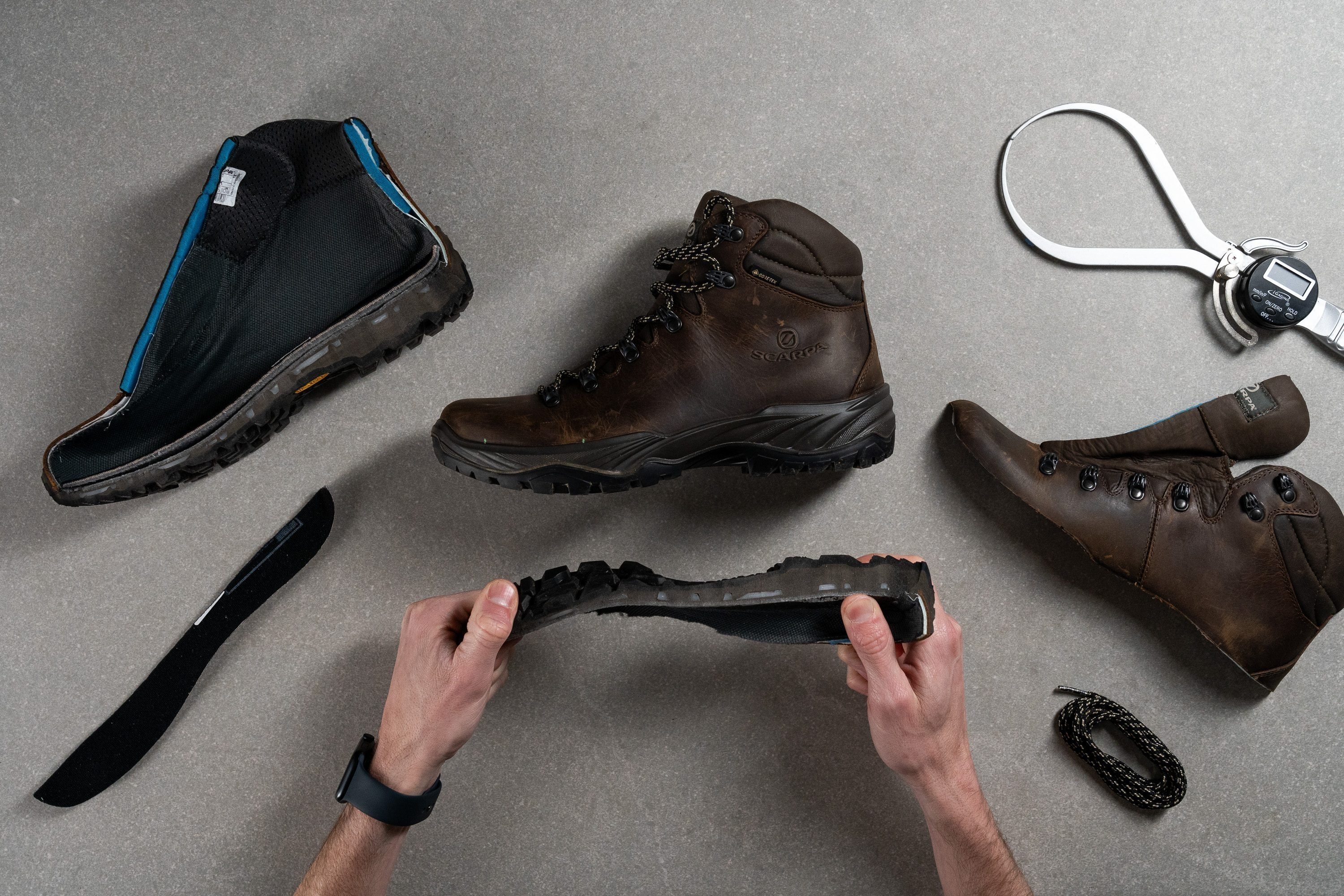
Insulation 101 in snow hiking boots
Insulation means warmth. The more insulated the boot is, the more extreme cold weather you can take in it!
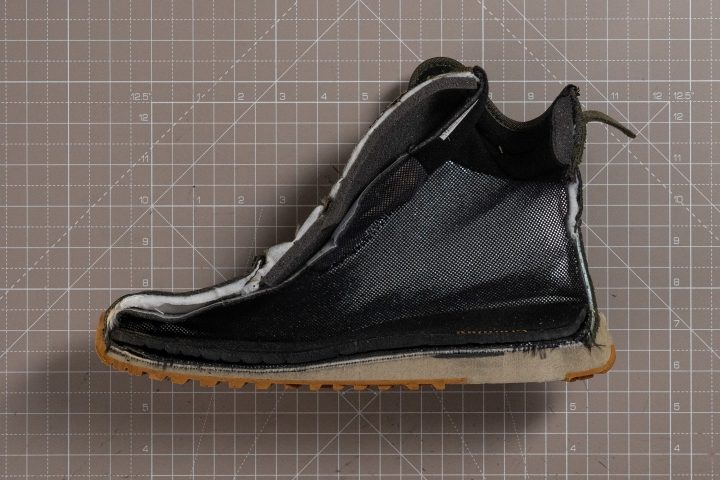
Insulation is measured in grams. You can see specifications like 100-gram insulation, 400-gram insulation, 800g insulation. The same specifications apply to other outdoor apparel, not just footwear. The higher the number, the more insulated the boot is. But, make no mistake, it does not make your boot 100, 400 or 800g heavier!
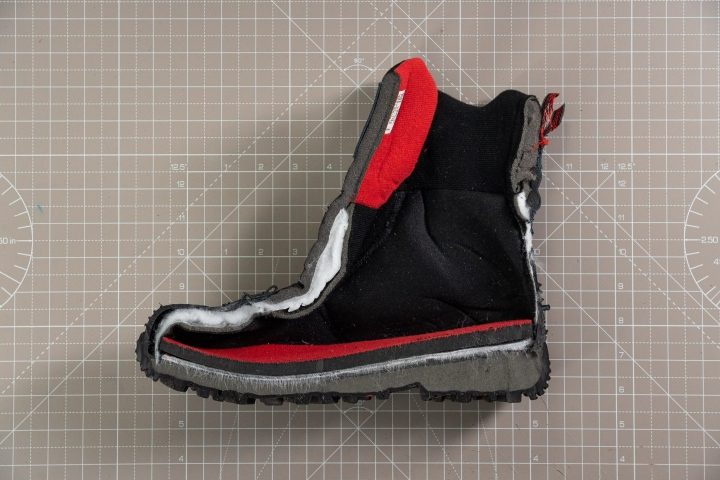
The number that describes the amount of insulation tells us how heavy that material is per square meter. Not per boot, shoe or a jacket. Of course, more insulated boots weigh more, but not as much as implied in the specification of the insulation.
See the table below to better understand the amount of insulation and which occasions it is best used for:
|
Weight (Grams/ Square Meter) |
Recommended Temperature Range |
Season |
Recommended Uses |
|
100 grams |
40 to 50 degrees F |
3- season |
|
|
200 grams |
30 to 40 degrees F |
3-season |
|
|
400 grams |
14 to 30 degrees F |
3-season |
|
|
600 grams |
-5 to 10 degrees F |
Winter |
|
|
800 grams |
-20 to -10 degrees F |
Winter |
|
Freezer test: boot performance at cold temperatures
When you first try your hiking boot on, you might love the level of softness or how flexible it is. But, what if that changes when hiking in very cold weather? What if that changes a lot?
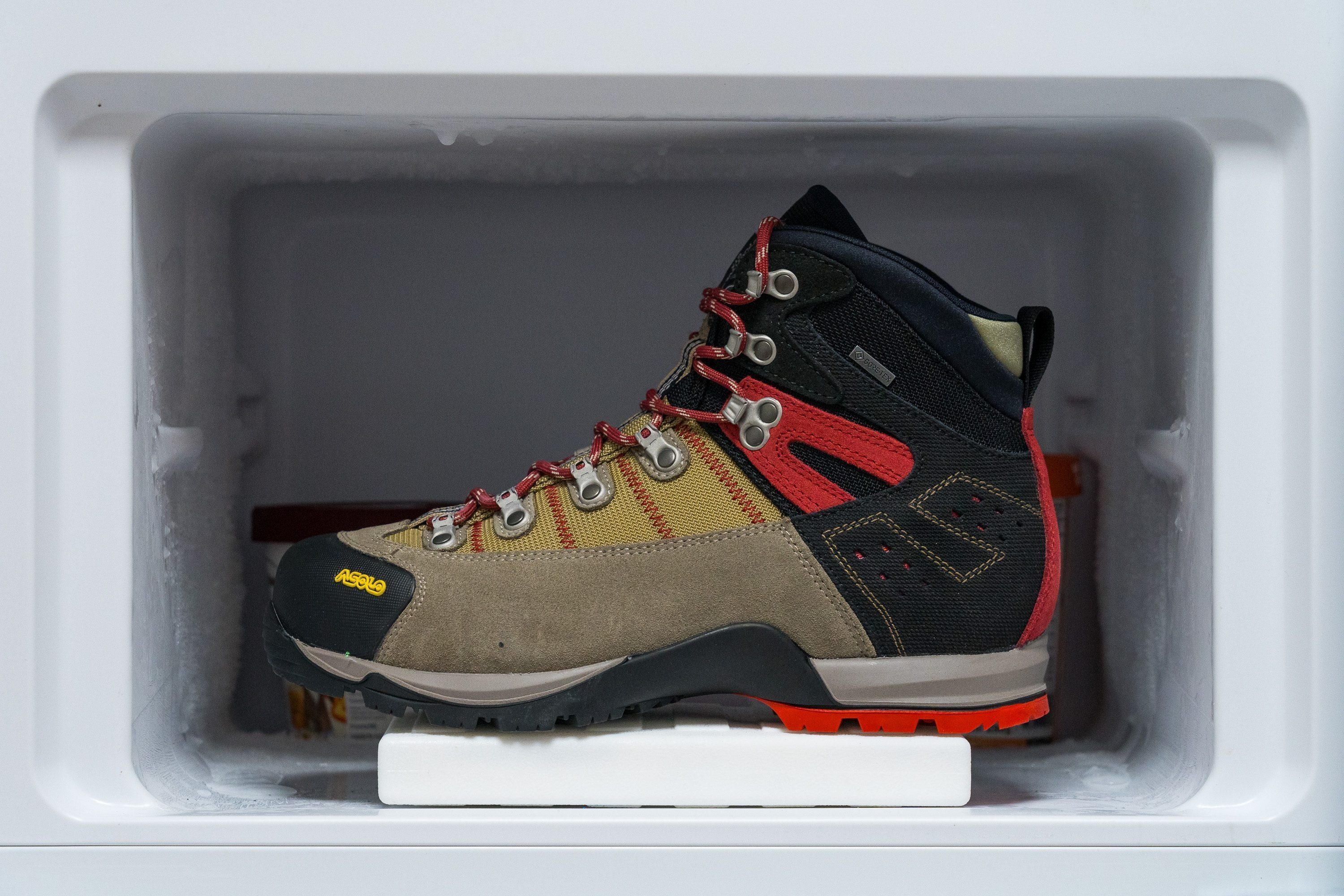
Here’s how we go about it. We showcase the difference in softness change and in stiffness change: at room temperature vs after being exposed to freezing temperatures. When these changes are smaller, it is more likely for a boot to feel and perform in cold weather, similarly to how it felt and performed at room temperature.
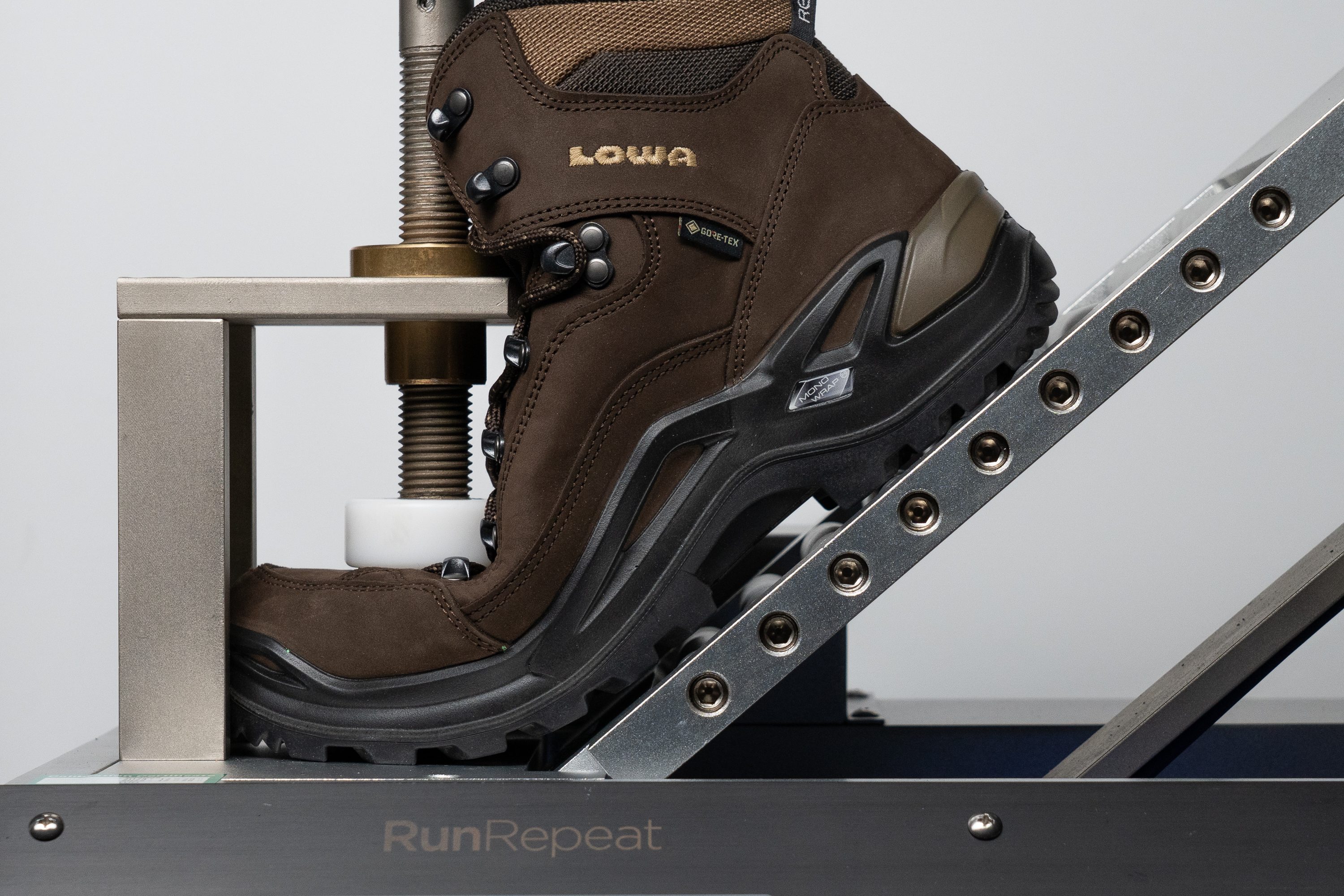
When testing the stiffness, the bigger number on the machine display means more force is needed to bend the boot to 30 degrees, which means it is stiffer. And when doing the durometer tests, a bigger number means it is firmer.
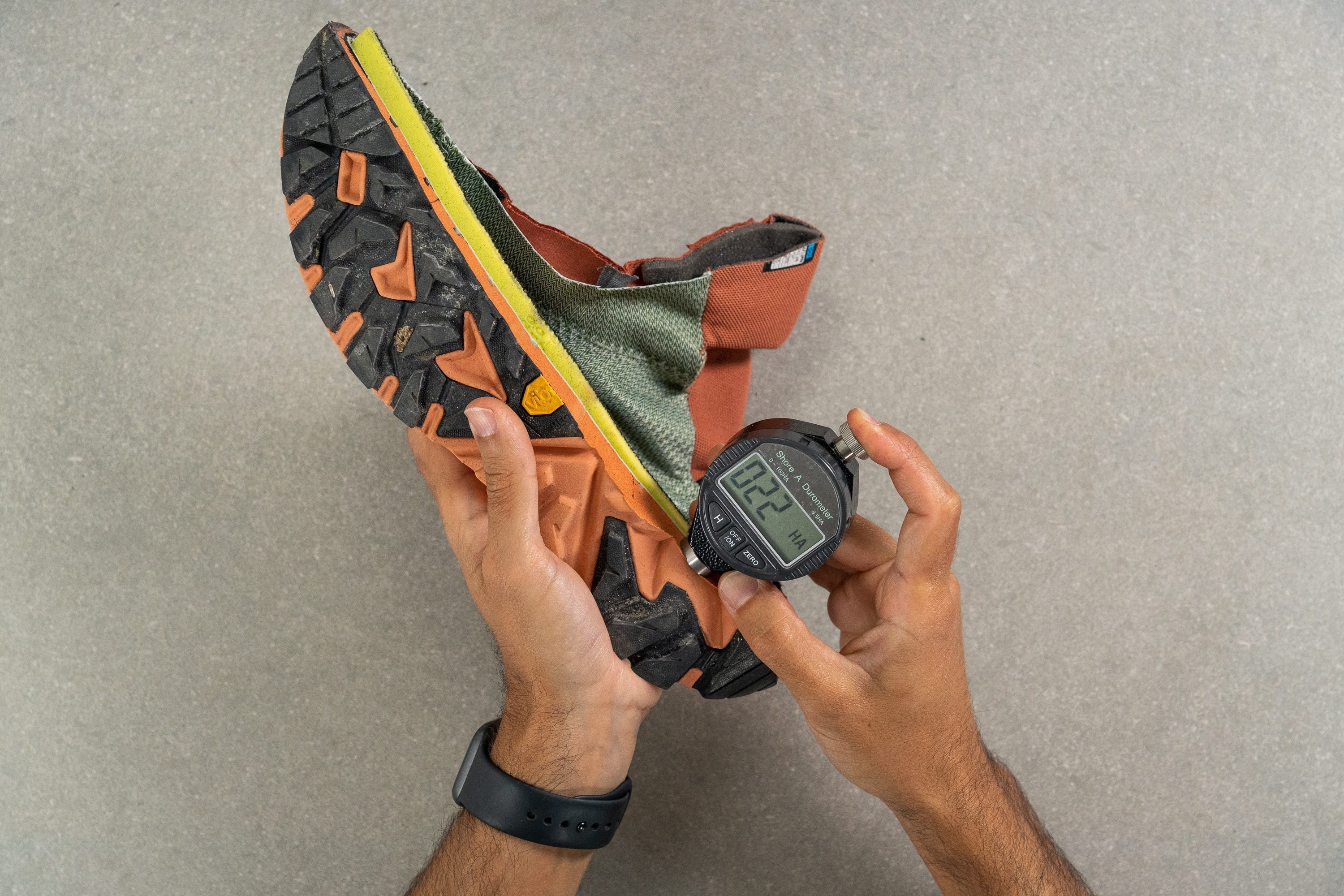
Bigger changes between these numbers at room temperatures and post-freezing them are a red flag and might mean you should keep the boots inside and still, they might not perform similarly.
To help you out with this decision, we sorted the hiking boots by the smallest difference in softness in the table below.
Waterproof means not breathable
Snow hiking boots are waterproof so that the snow can stay out and your feet stay dry. However, that waterproofness and sometimes even insulation, mean that the boot can’t breathe properly or.. At all.
We test the breathability of hiking boots by pumping the smoke inside and watching where the smoke comes out, at which pace, and how long it takes. Based on this, we rate the breathability of the boot on a 1-5 scale, where 1 is the least breathable.
Smoke test: non-breathable upper (left) vs a very breathable upper (right) in hiking footwear
To get a better understanding of these bad breathabilty ratings in snow hiking boots, we examine the upper under the microscope.

So, it’s not “just” the insulation and a waterproof membrane, it’s also how the upper is made, being more tightly woven and having no ventilation holes (when compared to the upper of a breathable summer hiking boot).
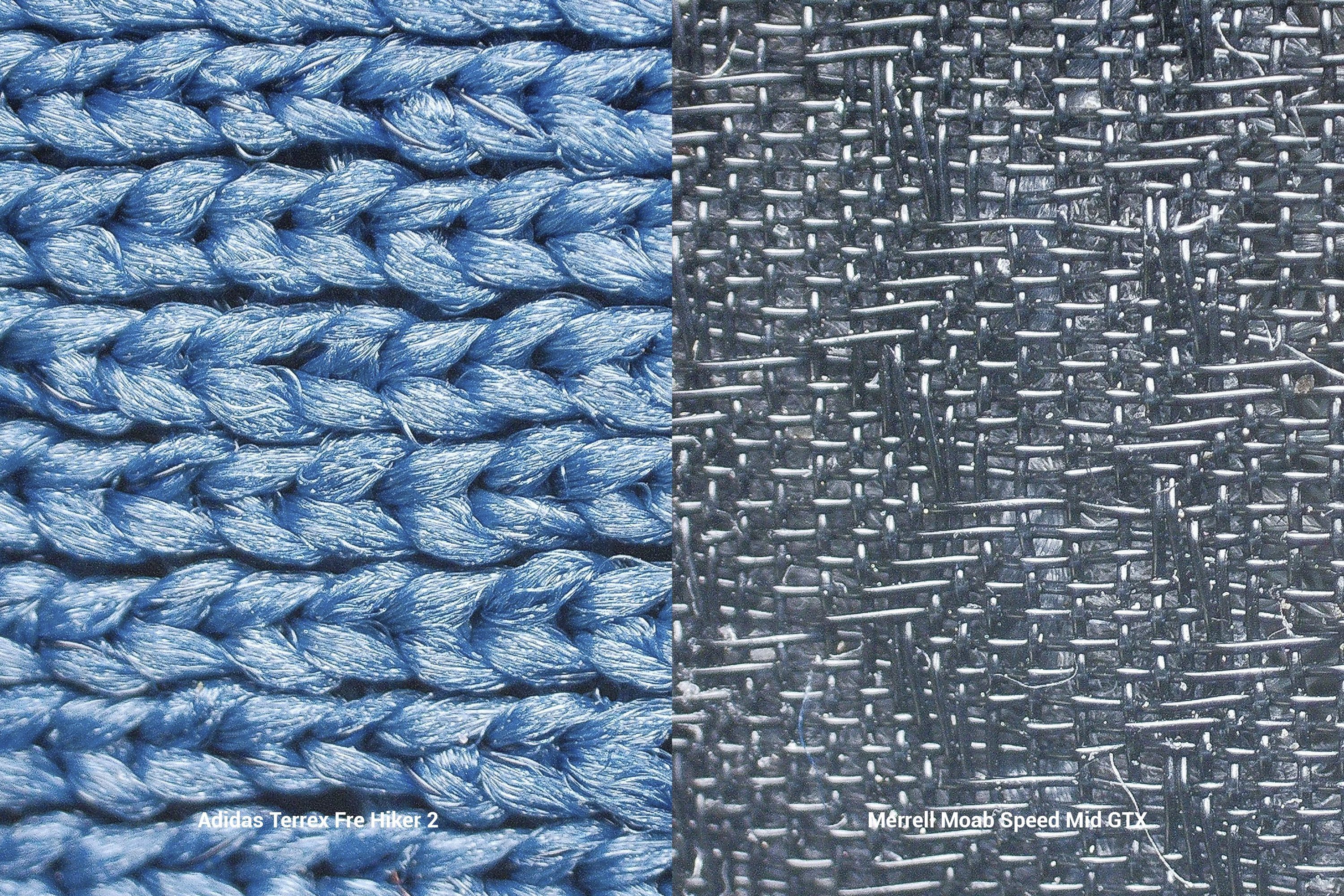
Best grip for snow
Snowy conditions mean you need deep lugs and, ideally, ones that are not too close to each other. Lugs that are spaced very far from each other are best for mud, those that are too close to each other are best for versatility - covering a bit of everything, and somewhere in the middle are those best for snow.
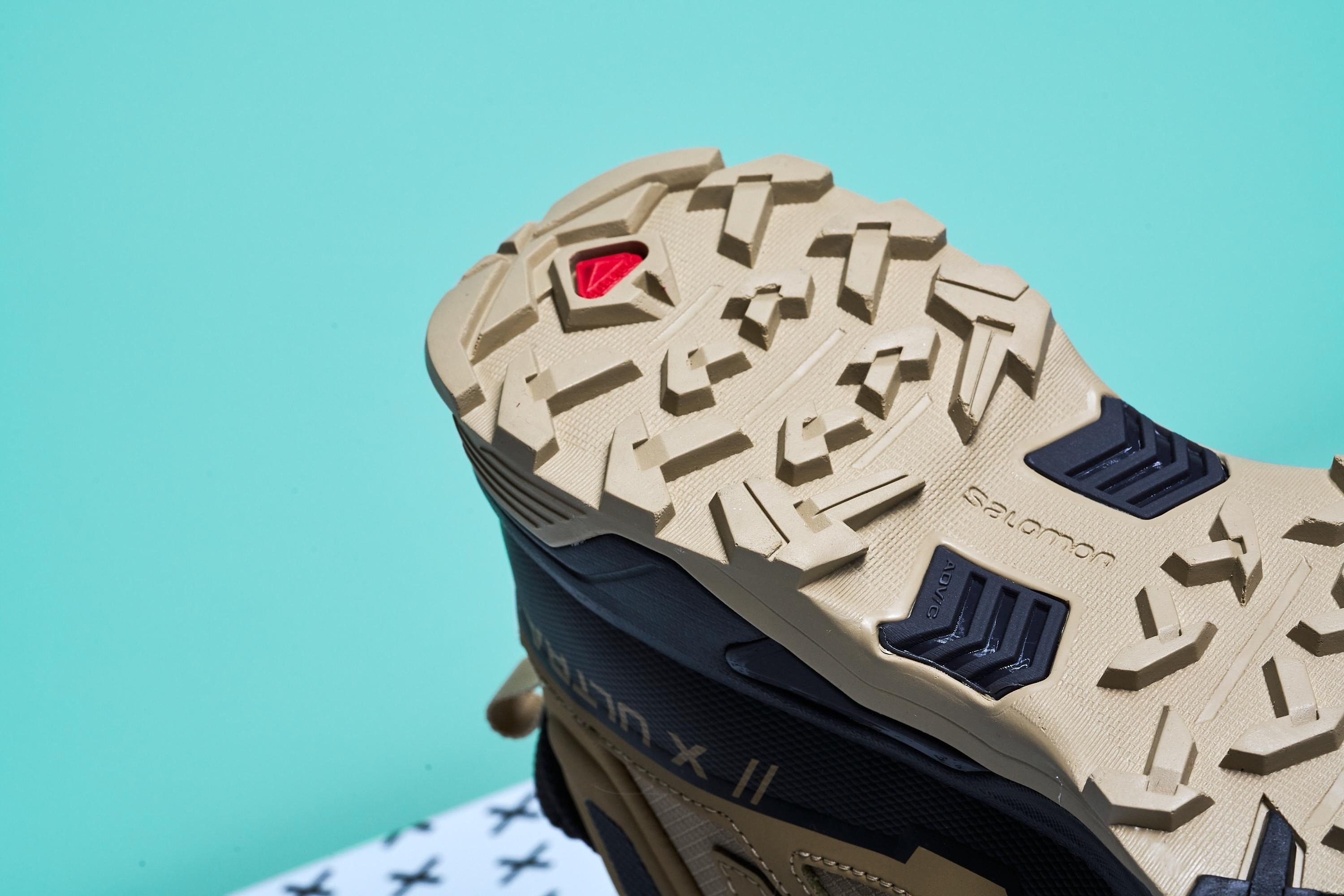
For snow, we recommend lugs that are at least 4 mm deep. We measure the lugs in our lab and always note the number down in every hiking boot review.
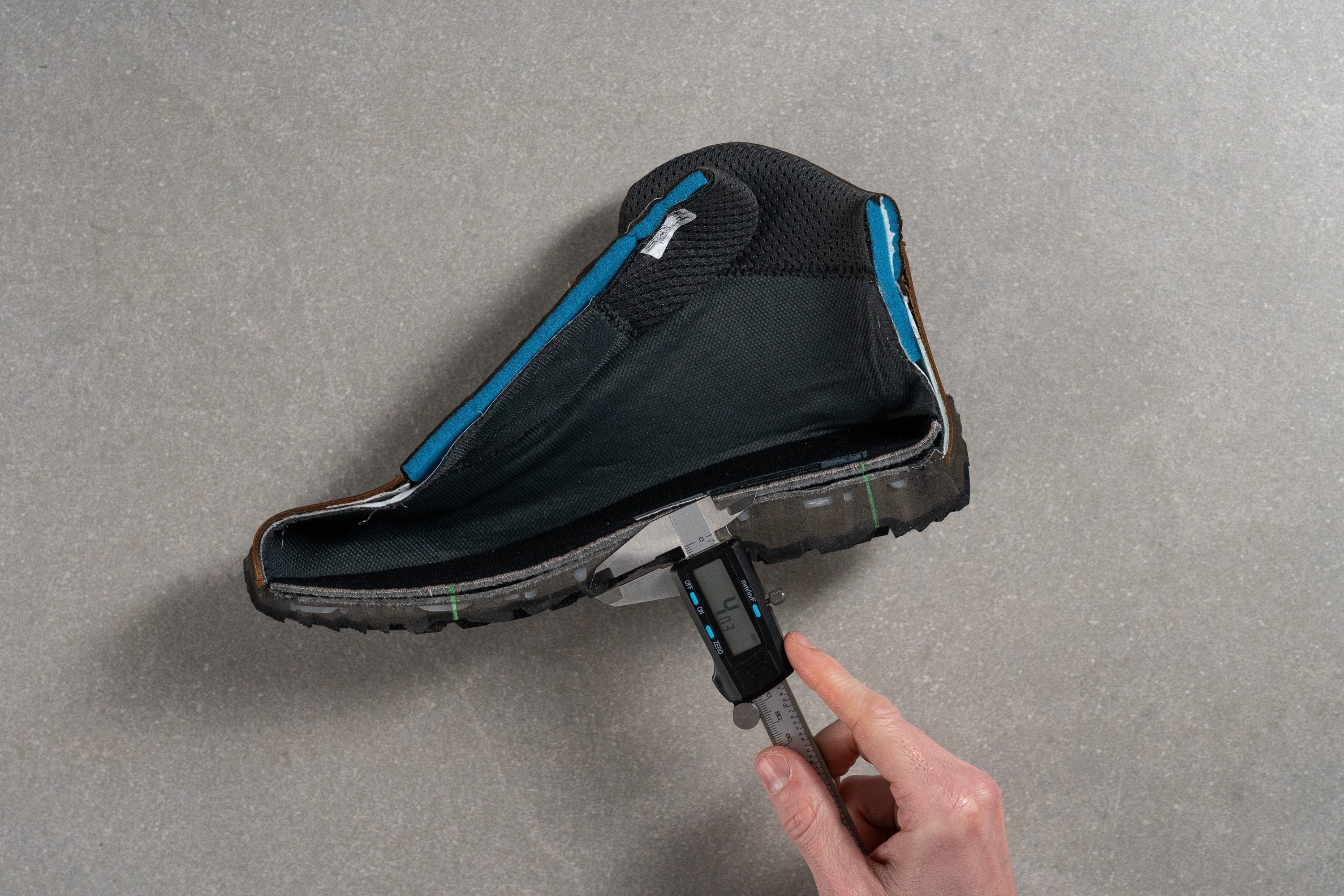
Not just that but we also measure the hardness of the rubber. This is important because harder rubber provides more protection and is more durable. Softer rubber is usually more pliable and stickier.
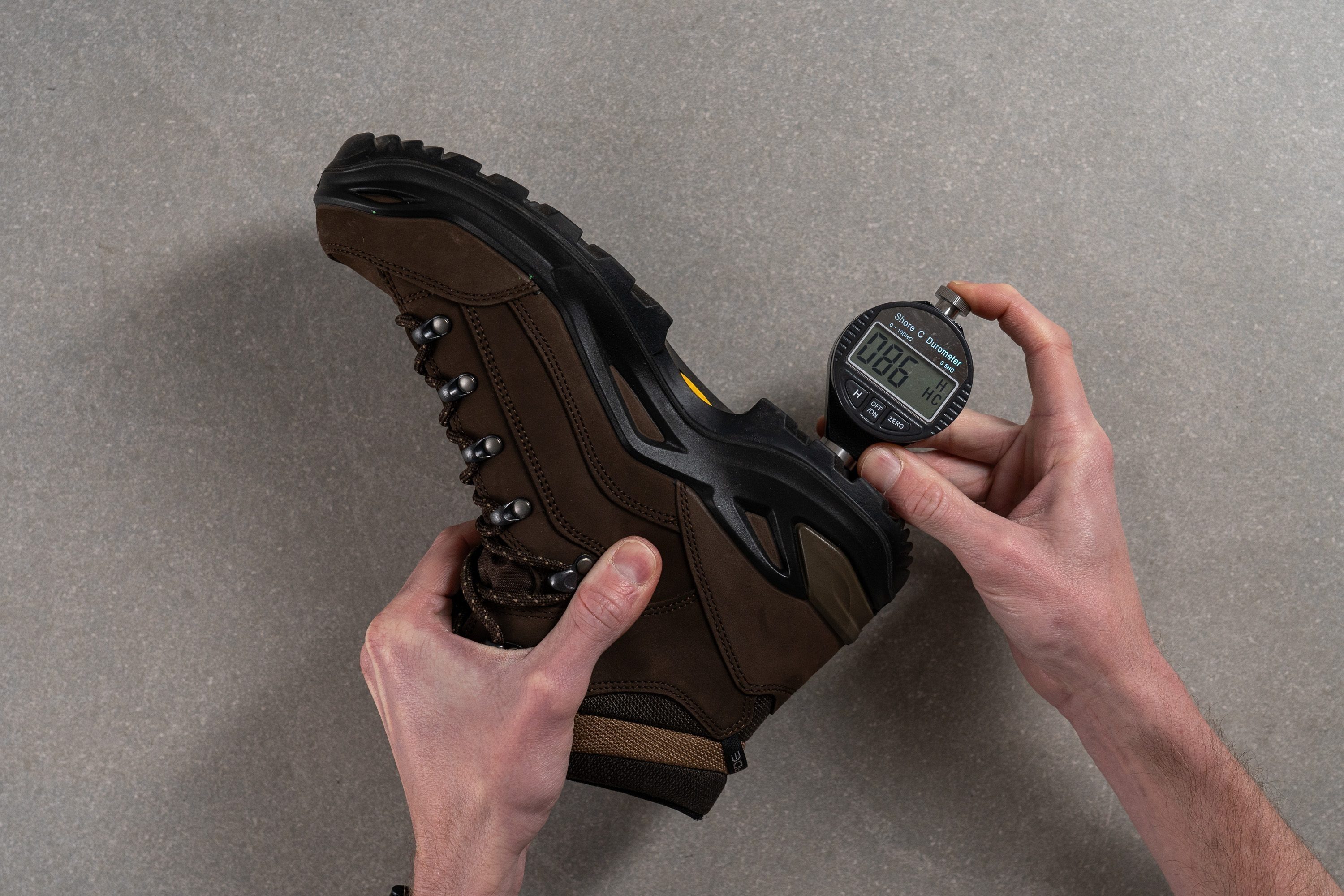
Wide-feet friendly snow hiking boots
Snow hiking boots have a lot of it going on. It’s not just the upper, but a waterproof membrane, and then also insulation (in some cases). Because of this, uppers are stiffer, toes have less room in the toe box, and you might want to look for something roomier.
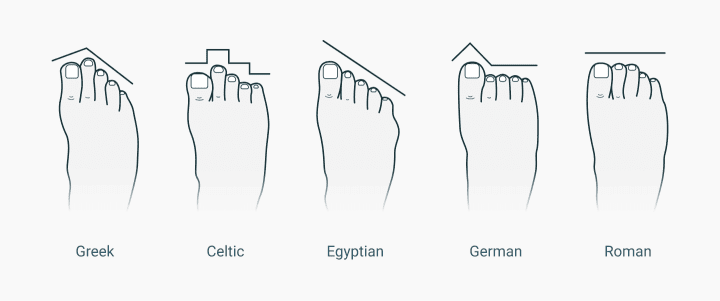
In our lab, we always measure the width of the shoe in 2 places. Based on this, we can examine which boots are pointier (taper more) and which boots are better suited for, say, Celtic or Roman type of forefoot.
Pouring a special gel into the boots and freezing it. It perfectly fills the boots so that we can measure the exact inner width of the shoe
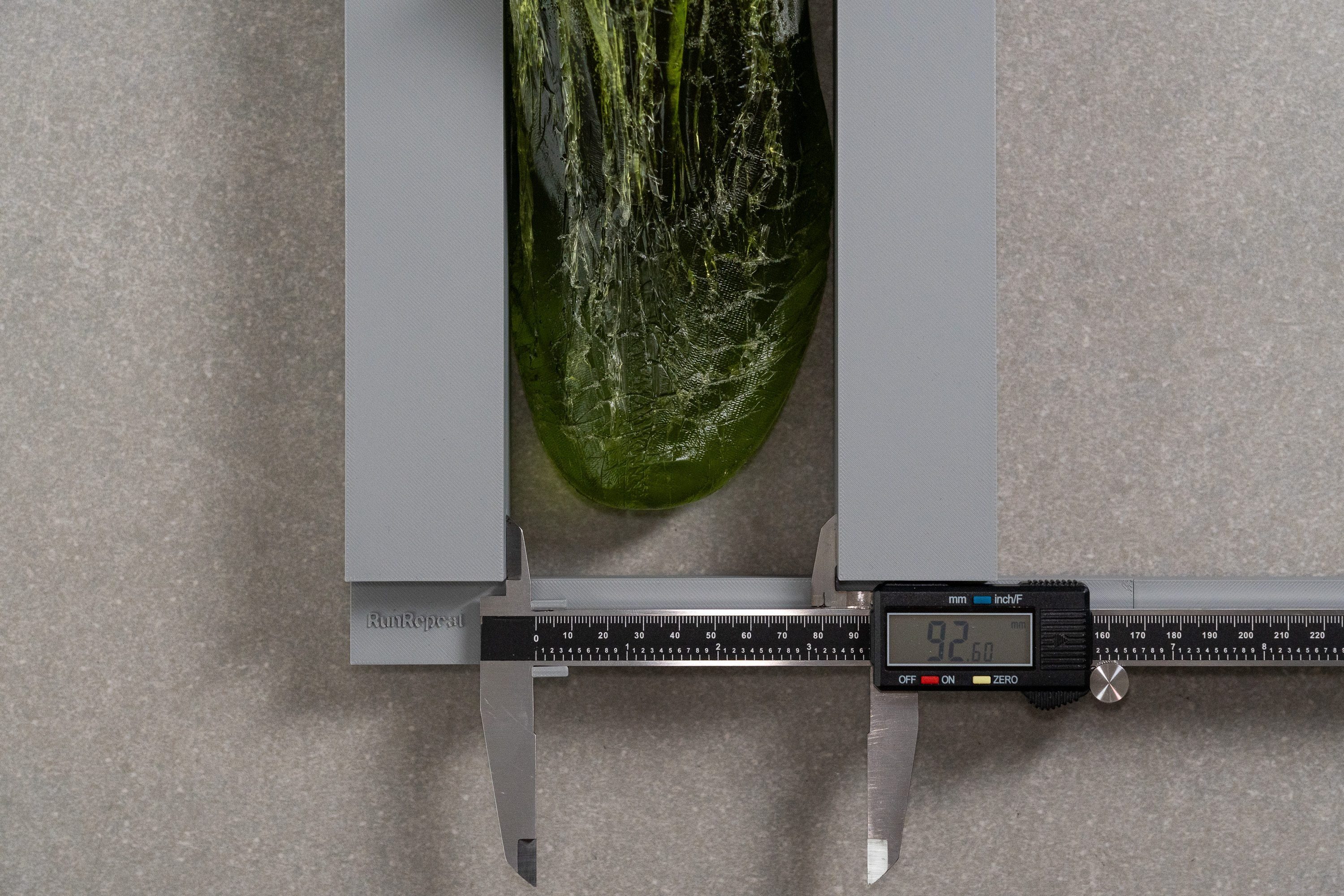
If this is where you need the most room, consider these snow hiking boots:
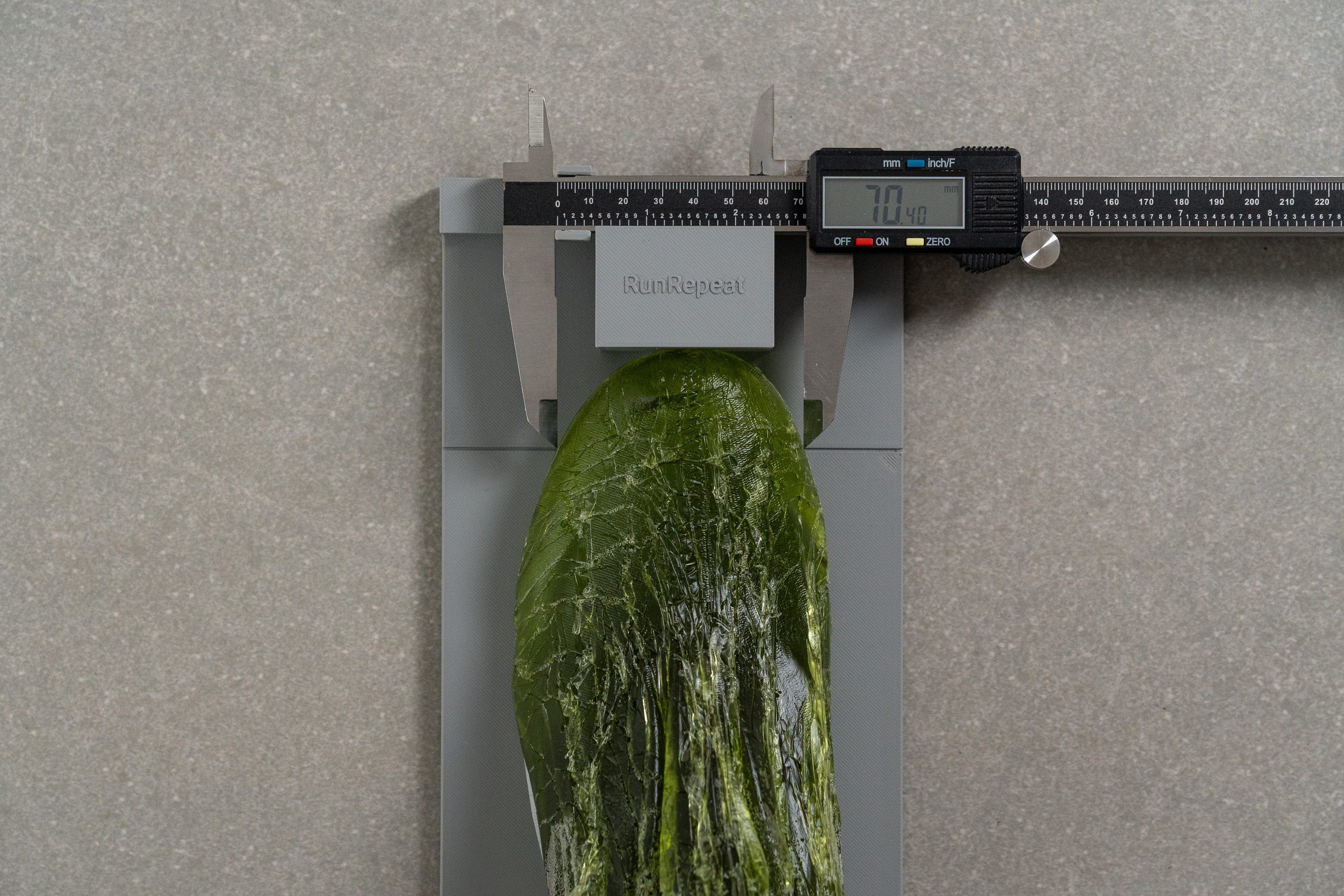
If you want the least pointy toeboxes in snow hiking boots, look at those with the widest toeboxes in that place:
Our gel mold also allows us to measure the exact height of the toebox. Knowing this measurement is great for hikers whose big toe may be pointing up or whose toenails become black. Also, hikers who love wearing thick socks when hiking in cold weather often need more room, both vertically and horizontally.
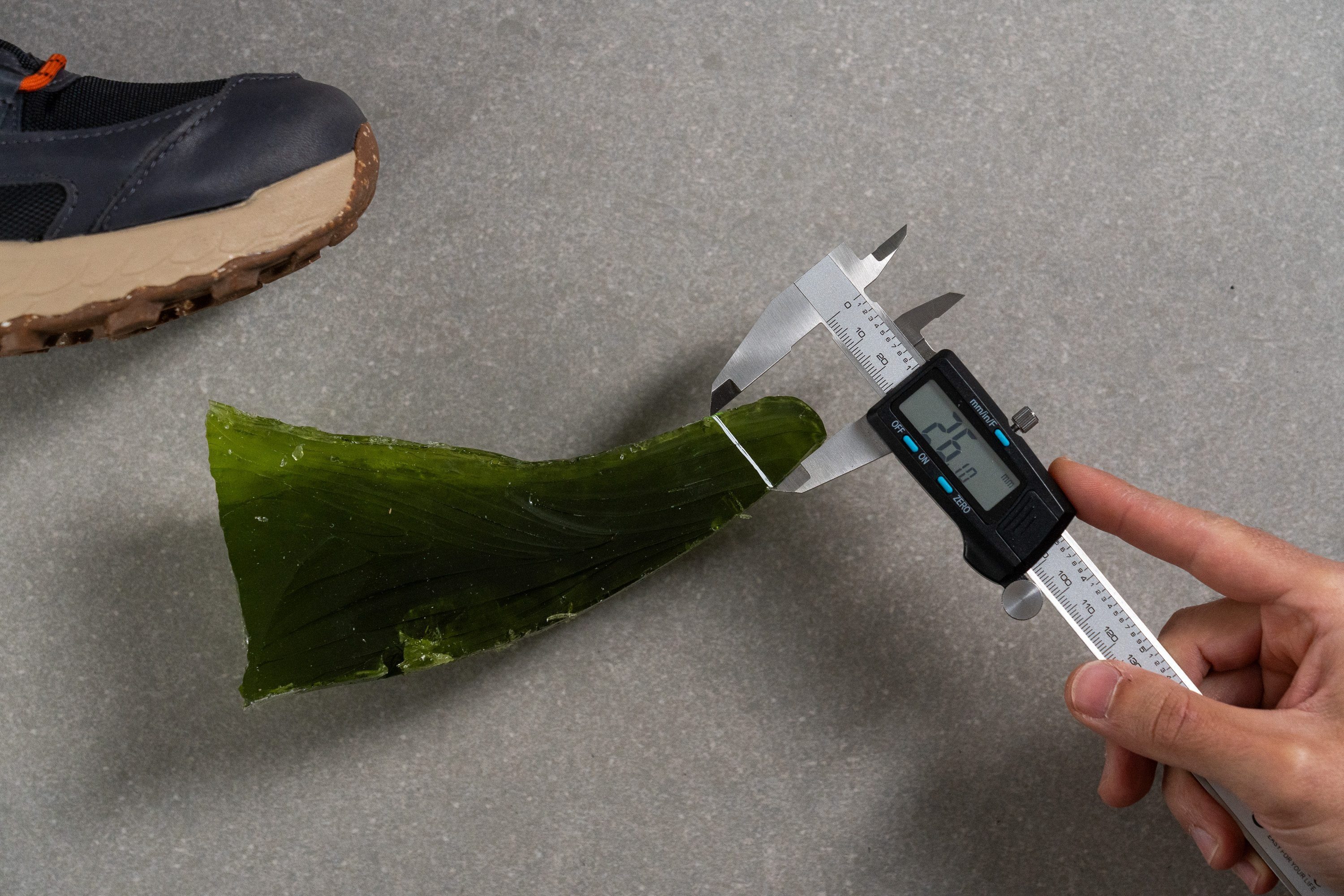
If the vertical space is what you need the most, look at the snow hiking boots with the highest toeboxes.
New to hiking boots? Nail the fit
In case this is your first time buying a pair of hiking boots and you’re not sure how to go about it, here are our recommendations that are a result of extensive research and testing:
- You should go boot shopping in the afternoon or evening. We advise this because by then, our feet are swollen up a bit, and similar swelling happens on the hike as well.
- When trying the boots on, use the hiking socks and also orthotics (if you’re using them).
- When you lace up the boot, there should be one thumb’s width of space in front of your toes. Or, you can push the foot forward as much as possible and check if your thumb can fit behind your heel.
- When trying the shoe on there should be no hot spots. It should feel comfortable: not too wide and not too snug.
- If you’re trying the shoe on in the specialized store, use the ramp covered with different materials like artificial grass and rocks. Go up and down. Your heel should not slip and your feet should not be sliding to the sides inside the shoe!
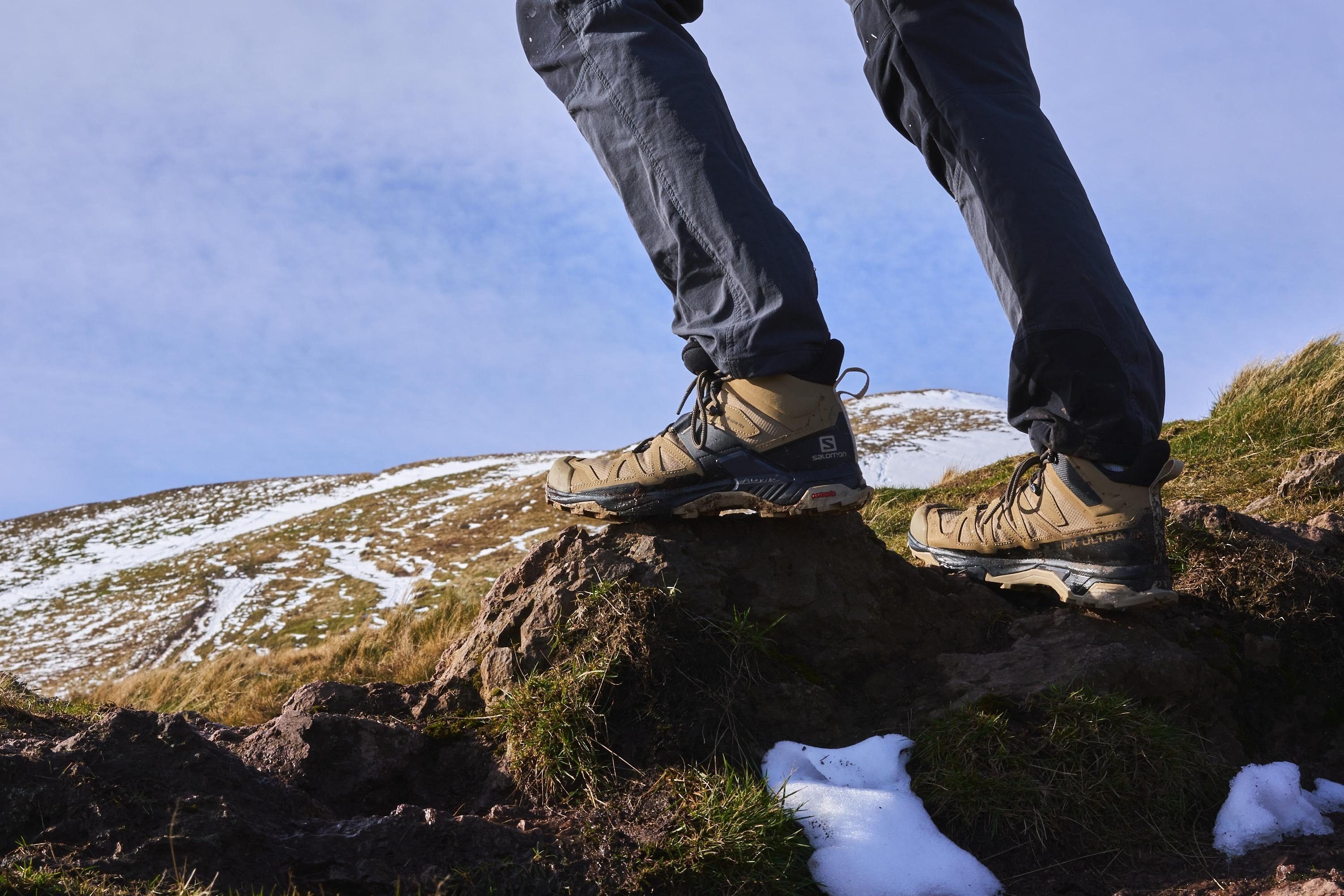
And, as always, keep in mind that many hiking boots need to be broken in before embarking on a (longer) hike. Do this to avoid blisters (best case scenario) and other inconveniences!
Up the ante: more waterproof protection
While snow hiking boots are as good as it gets - with their superb waterproof protection and maybe even insulation, water still can get inside of the boots and then it’s a nightmare to get it out. Such boots can’t dry out on their own while you keep hiking because they don’t breathe enough.
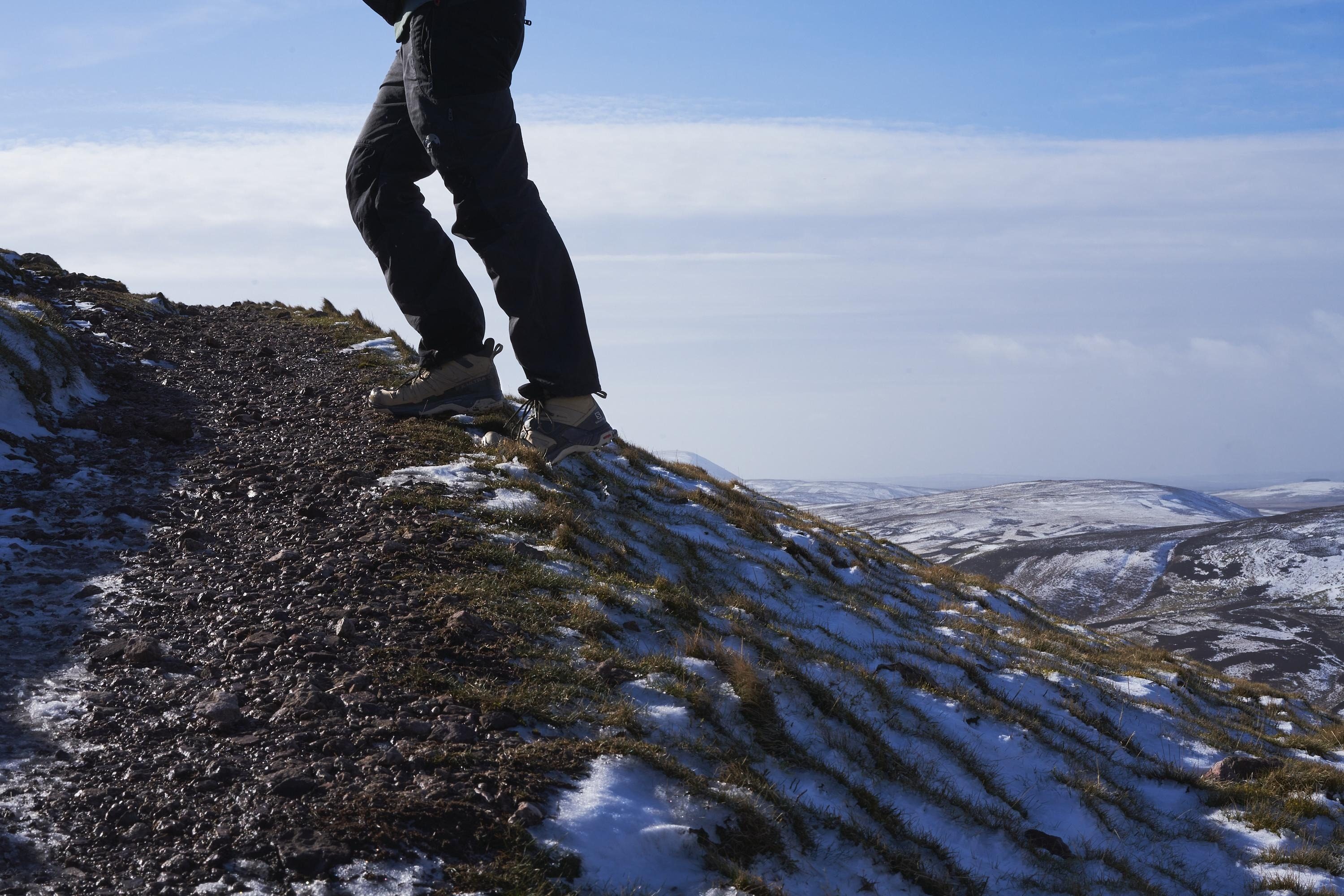
Because of that, we recommend getting knee-high waterproof gaiters They offer additional protection and work wonders at keeping the lower parts of the pants, boots, socks, and feet dry.
If you worry about perspiration and sweating inside snow hiking boots, we also recommend getting wool or bamboo socks. They come in different thicknesses, so you can choose thinner ones for not-so-low temperatures and narrower boots, or thicker ones when it’s really cold and you have enough room for them inside the boots.

